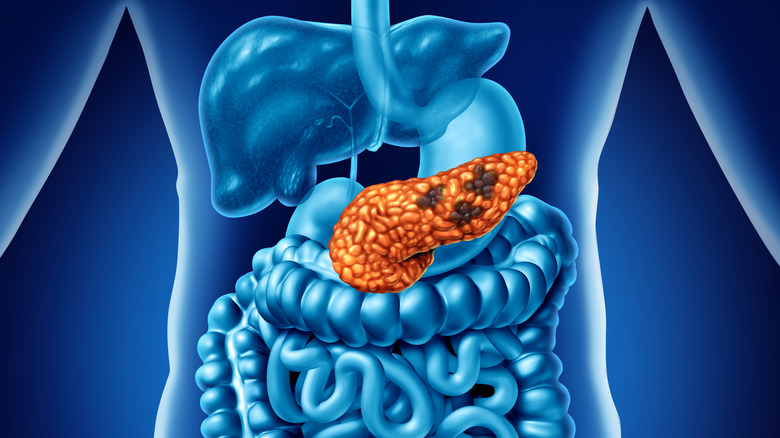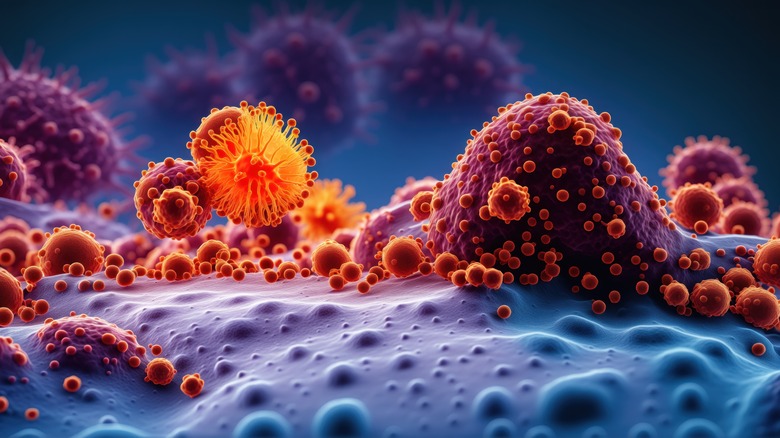The Pathway Causing Pancreatic Cancer Spread Was Identified, Here's What That Means
Many forms of cancer are devastating. But pancreatic cancer is one of the most deadly and aggressive forms there is. There are several reasons for this, including its stealthy progression, rapid metastasis (the way it spreads), and late detection. In fact, early detection is so rare there's a five-year survival rate of 13.3%. Over 80% of patients die due to metastatic progression within two years of diagnosis. But scientists may have discovered a way to slow it all down by studying a receptor that normally helps cancer cells spread, called ALK7. This is explained in a report published in Molecular Cancer. Interconnected ALK7-driven pathways typically promote pancreatic cancer cells, or pancreatic ductal adenocarcinoma (PDAC). To really understand what's going on, you have to look at two concepts related to cancerous tumors, called extravasation and intravasation.
The term extravasation describes a general leak of fluids or substances from human blood vessels into surrounding tissues. It can mean blood, medication, or, in this case, the cancerous cells. It's a multi-stage process through which most cancers spread. But to do that, cells must first bypass a fleshy barrier of sorts. Intravasation describes that process: the invasion of those cells through the basement membrane (or wall) of a blood vessel. The tumor cells breach the fibrotic stroma and vascular barriers, and once they're through, they can propagate using extravasation much more efficiently, thereby traveling to remote parts of the body, including other organs. But by leveraging ALK7 receptors and turning them off, scientists believe they can stop these two processes, thus stopping the spread of cancer. If true, that could lead to higher survival rates, better treatments, and maybe even a method to prevent late-stage progression altogether. In some ways, it's not unlike a revolutionary new one-second cancer treatment that could potentially replace radiation, currently a core treatment for most cancers.
Understanding the ALK7 pathways and pancreatic cancer progression
Scientists have actually known about the ALK7 pathways for a time. Some studies have shown them to be anti-metastatic, and others the opposite, pro-metastatic, meaning there are arguments it either supports or prevents progression. The scientists studying the ALK7 pathways in the Molecular Cancer study believe that discrepancy is because of variations in either the different types of cancer or the differences in how the various studies were carried out.
To investigate, scientists injected PDAC cells into the pancreas of five-to-six week-old immunodeficient NSG mice and then administered inhibitors of "ALK family receptors" — ALK7 among them — and monitored tumor growth for three weeks. The findings suggest there is a way to reduce or stunt tumor growth using these pathways. But, of course, further testing will be necessary, and if those prove successful, rigorous development and then clinical trials are in order before anything usable is produced.
But this is not the first time a previously known factor was revisited by researchers. For example, AI solutions have helped design an innovative cancer treatment plan, and it's one that uses available drugs — the kind used to treat high cholesterol and alcohol dependence. AI is also helping to improve cancer detection with a 99% accuracy rate, and that's absolutely mindblowing. It means aggressive and deadly forms of cancer, like pancreatic cancer, could be spotted early before they're debilitating and dangerous. But rapid detection pales in comparison to the achievement of truly stopping the spread through treatment. It's early to say, but the ALK7 discovery could prove revolutionary for slowing PDAC.

